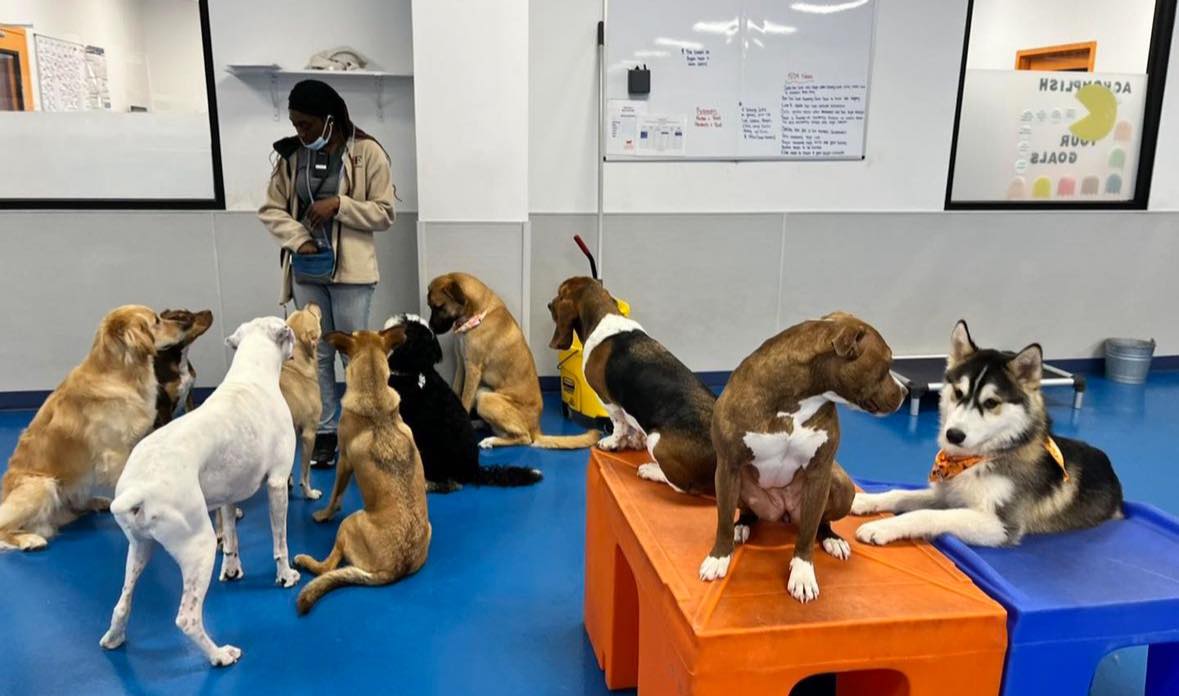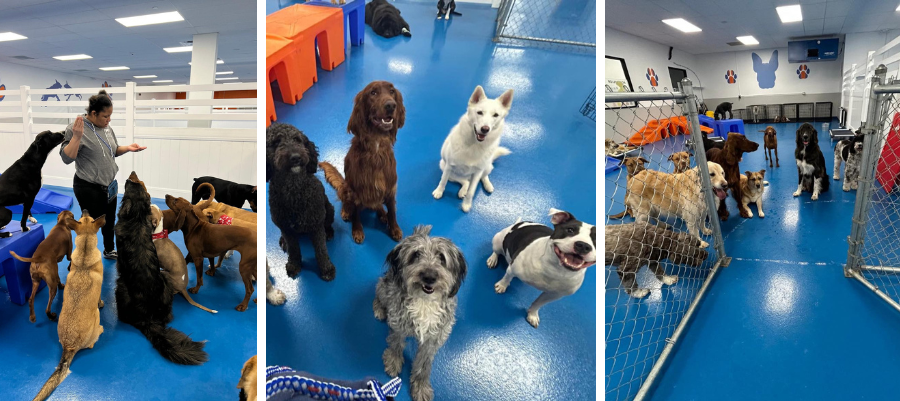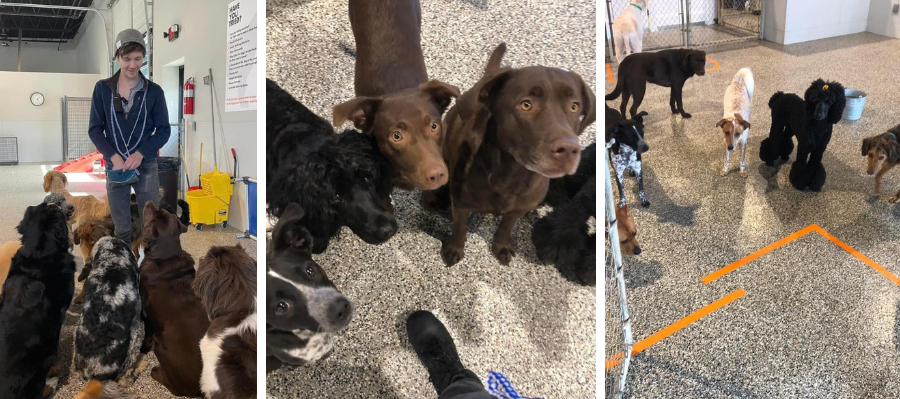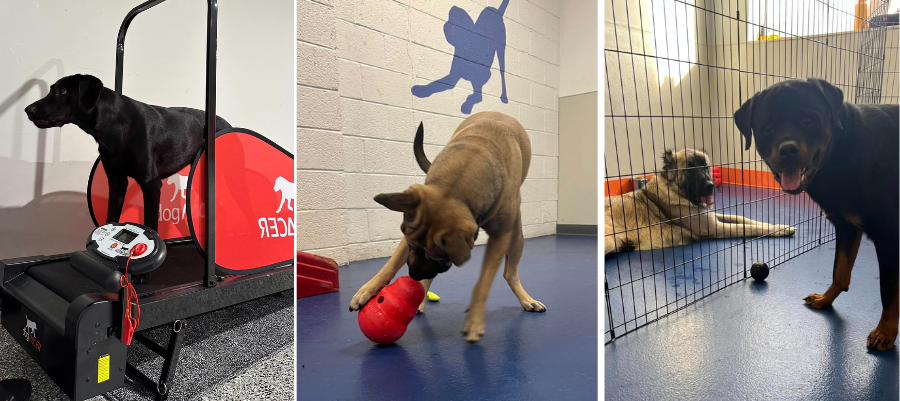Reintroducing Your Dog to Doggy Daycare: Everything You Should Know

REINTRODUCING YOUR DOG TO DOGGY DAYCARE
At Canine To Five, our top priority is the well-being and comfort of your dog. We understand that life can get busy, and sometimes, it’s been a while since your dog last visited us for daycare or boarding.
Our team is always overjoyed when an old face returns to our care, but sometimes the feeling is not mutual. When doggy daycare is no longer part of your dog’s routine, returning can feel like the very first day of daycare – all over again! Even if your dog regularly visits dog parks or has playdates with friends, doggy daycare involves more stimulation for a longer period of time that can be overwhelming for a dog who is no longer used to that level of structure during their day.
Because of this, if your pup hasn’t attended daycare or boarding at one of our Metro Detroit locations in the past six months, we’ll require a re-evaluation to ensure our facility is still the right fit for your dog.
Read on to learn why this policy is in place and how it benefits everyone involved!
WHAT IS A RE-EVALUATION?
A re-evaluation is essentially a day of daycare, with the same associated cost, where our Pack Leaders observe your dog for signs of discomfort or stress. We look at several factors, including:
- Behavior Upon Arrival: How your dog reacts when they first enter the facility.
- Comfort with Handling: How they respond to being touched and guided on leash by our staff.
- Playtime Behavior: Interaction with other dogs or staff during play.
- Dog-to-Dog Corrections: How they handle and give corrections in social settings.
- Recall Ability: Responsiveness to commands.
- Taking a Break: Comfort level in a crate or kennel when given a break.
- Overall Comfort Level: General demeanor and relaxation.
We’re also always looking out for behaviors that can be problematic in a daycare environment, such as:
- Humping That Cannot Be Redirected: Our team is equipped to manage periodic humping, but when a dog is persistent and unable to be redirected, it can lead to an altercation and potential injury. Learn more about this behavior on our blog.
- Chasing or Zoomies That Can’t Be Interrupted: This behavior can seem like good fun, but without intervention, it can lead to other dogs joining in, making it difficult to control the playroom. It can also result in tagging from other dogs who want the running to stop, and lead to potential injuries.
- Fixation on a Particular Dog: Persistent sniffing, fixation, or overly pushy behavior towards a specific pup can make dogs uncomfortable, leading to potential altercations.
- Colliding with Others/Rolling or Tackling Other Dogs: Lack of body awareness can result in rough play or accidental injuries. Pet parents can view this as their dog getting in trouble for playing too much, but in reality, this behavior puts your dog and others at risk for injury.
- Demanding Play from a Dog That Isn’t Interested in Playing: Not respecting another dog’s signals to stop playing can lead to conflicts. Our team is trained to ensure all dogs’ space signals are respected by redirecting persistent pups.
- “Third Wheeling” During Play or Being the “Fun Police”: When two dogs are engaged in healthy play, a third pup can try to insert themselves, either to join along or stop the play. This can cause the playing dogs to redirect and snap at the third dog, or cause the third dog to nip at the dogs who are playing. In this instance, our team will attempt to redirect the third dog and give them an alternative activity.
- Relentless Barking, Even When Asked Not To: Constant barking that cannot be redirected can create a stressful environment for other dogs and staff, making it difficult to calm the playroom.
- Reactivity: Overreacting to stimuli, such as dogs running, playing, leaving or entering the playroom, by lunging, snapping, pinning, or biting, can be dangerous for everyone involved.
- Resource Guarding: Becoming stiff or reactive when dogs come near an object your pup has in their possession. This could be treats during a group sit, a stick, leaf, poop, chunk of ice or snow, the water bucket, their four-legged sibling, or even affection from our staff.
- Space Sensitivity: Discomfort with having their personal space invaded can result in defensive behaviors. Our team is trained to ensure each dogs’ space signals are respected, however, some dogs can overreact and give too harsh of a correction to other dogs, leading to potential altercations and injuries.
- Gate Fixation: Obsessive focus on gates or entrances that cannot be redirected can indicate anxiety or territorial behaviors. This can lead to persistent escape attempts, or intense fixation on whoever is entering or leaving the playroom.
- Barrier Frustration: Frustration when confined or separated by barriers can lead to reactivity, causing “fence fighting” scenarios.
- “Rude” Behaviors Like Mouthing/Nipping/Jumping Up on Staff: These behaviors can appear playful, but can cause injury to our team. Dogs who bite at pony tails, pull on leashes that are around our team’s bodies, ripping clothes, biting at shoes, or mouthing at arms and hands can make it difficult for the staff to monitor the rest of the playroom, and cause an uncomfortable work environment.
- Destructive Behavior: Chewing or clawing objects can be a sign of anxiety or boredom and can lead to self-inflicted harm such as cracking/pulling out a tooth or nail.
- Self-Inflicted Harm: Behaviors like excessive licking or biting themselves can indicate high levels of stress or anxiety and can lead to injury. We recommend stuffed Kongs for dogs who struggle with this behavior.
This careful observation helps us understand your dog’s current comfort and behavior levels, ensuring they have a positive experience.
THE IMPORTANCE OF RE-EVALUATIONS FOR OVERNIGHT STAYS
Re-evaluations are especially crucial if you need your pup to stay overnight with us. We want to ensure your dog is comfortable with our team, other dogs, and being in our care for an extended period of time prior to their stay.
Canine To Five owner Liz Blondy shared a heartfelt story that highlights the importance of this process:
“I had to do something awful yesterday. I had to ruin someone’s vacation, and if you know me at all, you know how obsessed I am with vacations. When someone makes a boarding reservation at Canine To Five, and the dog has never been with us, or it has been a while (more than 6 months) since we have seen them, the dog needs to come in for the day, and we ask the pet parent to come in 1-5 times before their travel so the dog can get to know us, and so we can get to know the dog.
Yesterday, a dog was dropped off for a 9-night stay with us, and within 3 hours of the dog being with us, we realized we could not touch the dog. He was there with his doggy sister, and he was “resource guarding” her. There was no way the team could safely move him in and out of the yards, his kennel, or throughout the building. He was a younger dog who had boarded with us a year ago, and then came in just once for his “re-evaluation.” We had asked that the parents bring him in a few more times before boarding, but they were not able to. No shame on them, life happens! This guy was scared of this unfamiliar place and was reacting out of fear.
So, I had to call the owner and ask her to come get her dog. She was already at the airport. TO GO SOMEPLACE FUN! My heart sank as I called her. But I knew, as the owner of the business, that it was my responsibility to provide my employees with as safe a workplace as possible. I felt so bad, but it was the right decision.
I know that it is a lot to ask for pet parents to come in a few times before they travel – it is both an investment of time and money. We would not ask if not for the above type scenarios. Please make it so we don’t have to ruin future vacations!
PS – Happy ending, the dog owner referenced above was able to get a family member to come get her dog. Vacation happened!!”
WHY SIX MONTHS?
A lot can change in six months with your pup’s development, especially if they haven’t been actively socializing. Additionally, Canine To Five can have new team members and new dogs that your pup is unfamiliar with. Dogs who were once comfortable in daycare when they visited regularly can return apprehensive, overwhelmed, or exhibit reactive behaviors. Just like their first day all over again, dogs may take a few visits to get back into the routine of doggy daycare.
This is why we strongly recommend dogs attend daycare at least once per week to keep their routine consistent. Should you ever need us on a more frequent basis, or for a long boarding stay, your pup will already feel comfortable with us which helps minimize potential behavioral issues that may arise while you’re away.
AVOIDING STRESSFUL SITUATIONS
We don’t want to force your dog into an uncomfortable situation to accommodate a last-minute boarding stay. By ensuring your dog is re-evaluated and has visited a few times before their stay, we can provide a safe and enjoyable environment for them, and peace of mind for you.
In some instances, the best place for your dog might not be pack-style play at all. That’s why we offer Pawsitive Enrichment. This daycare and boarding option provides more individualized care with opportunities for smaller doggy playdates. We’ll ensure your dog is receiving a mixtures of physical exercise, brain games, and companionship by offering activities such as:
- Walking on a doggy treadmill (gradually introduced)
- Food puzzles
- Fetch & flirt pole sessions
- Obedience sessions
- Scent tracking
- Doggy playdates (evaluated for compatibility)
- Rotating seasonal enrichment activities
- & Much more!
Ultimately, there are a few instances where an at-home pet sitter would be a better option over a daycare or boarding facility. If your pup exhibits the following behaviors, they may be dismissed from our facility entirely:
- Reactivity around other dogs
- Reactivity when in their kennel
- Excessive barking, drooling, or pacing that cannot be managed
- Destructive behavior or self harm
- Lunging, snapping, or biting our staff
- Unable to be touched or moved around the building on a leash
- Fearful behaviors that cause your pup to shut-down and not eat or drink
- Fear or reactivity toward specific genders (i.e; Afraid of men)
- Resource guarding towards our team; Unable to feed them or take away toys
Canine To Five recognizes that these signals indicate a dog is not happy in our care, and will not pressure a pup to stay with us for their safety, and the safety of our team.
SEE YOU SOON!
We appreciate you for trusting us with your beloved dogs. We look forward to seeing them soon and ensuring their stay is as comfortable and joyful as possible!
Eager to join in on the fun? Here’s what you’ll need to start:
- Your pup must be between 12 weeks – 12 years old
- They must have their DHPP, Lepto, Bordetella, and Rabies vaccines (Rabies by 18 weeks old for puppies)
- Puppies over 9 months old must be spayed/neutered to participate in our pack-style environment; Unaltered dogs may continue to join us for Pawsitive Enrichment
If your dog is eligible to start, click here to fill out our new client inquiry form and our Canine Concierge will get in touch with you to go over next steps!





